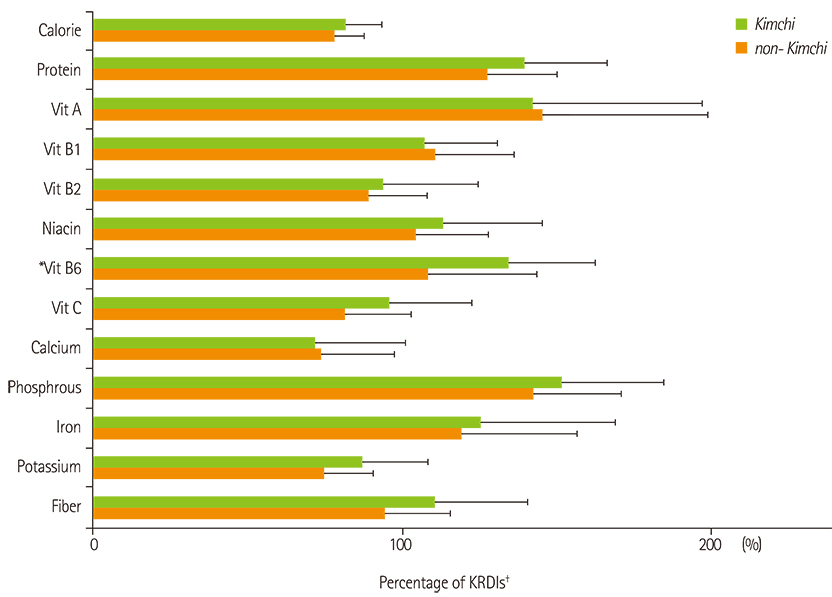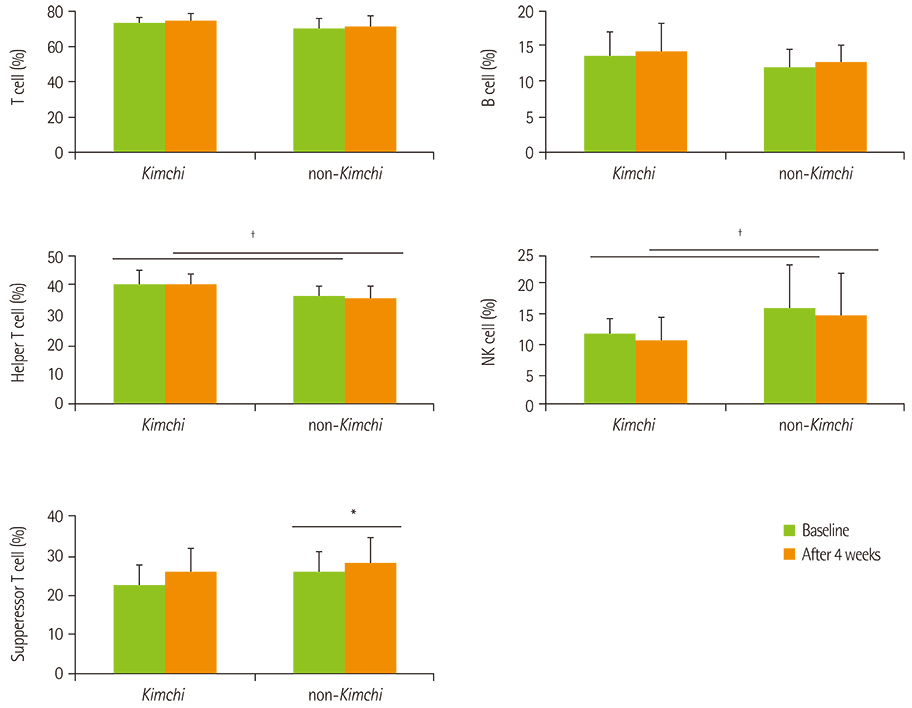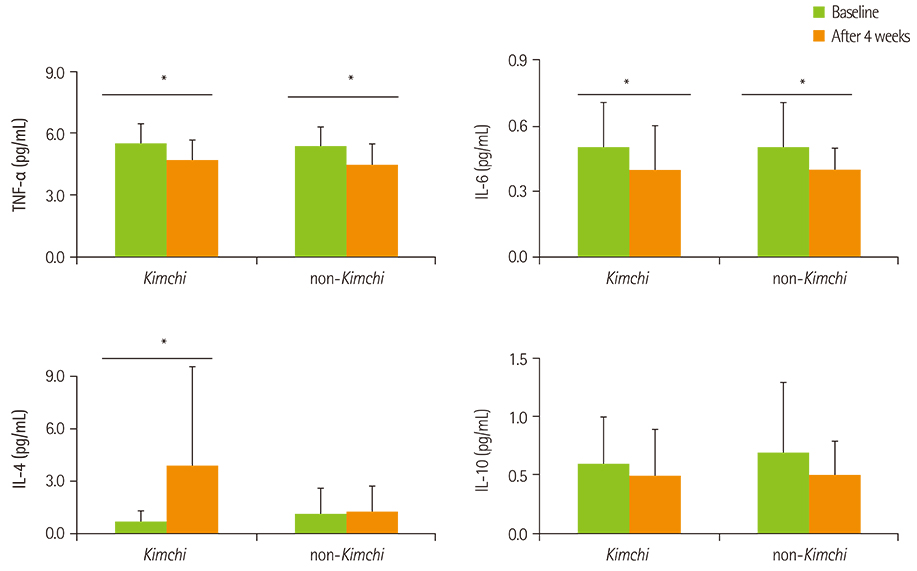Clin Nutr Res.
2014 Jul;3(2):98-105. 10.7762/cnr.2014.3.2.98.
Immunomodulatory Effects of Kimchi in Chinese Healthy College Students: A Randomized Controlled Trial
- Affiliations
-
- 1Department of Medical Nutrition, Graduate School of East-West Medical Science, Kyung Hee University, Yongin, 446-701, Korea. rwcho@khu.ac.kr
- 2Research Institute of Medical Nutrition, Kyung Hee University, Seoul 130-701, Korea.
- 3World Institute of Kimchi, Gwangju, 503-360, Korea.
- KMID: 2279555
- DOI: http://doi.org/10.7762/cnr.2014.3.2.98
Abstract
- This study examined the potential immunomodulatory effects of Kimchi, a traditional fermented Korean vegetable, in healthy Chinese college students. The four-week clinical-trial (randomized, open-label, prospective, controlled) was followed by a one week wash-out period. Healthy Chinese college students (over 20 years of age with a body mass index of 18.5-23.0 kg/m2) volunteered for this study. Forty-three students were randomly classified into two groups, Kimchi (n = 21, supplemented with 100 g of Kimchi per day) or non-Kimchi (n = 22, supplemented with 100 g of radish per day, control) groups. During the four-week intervention period, students were asked to maintain their usual diet and activity, and instructed not to take any medications, functional food products, or dietary supplements. Anthropometrics, nutritional intake, and blood immune parameters (lymphocyte subsets, cytokines, and immunoglobulins) were measured before and after the four weeks of intervention. Thirty-nine students (19 in the Kimchi group, 20 in the non-Kimchi group) finished the study. After the intervention, no significant changes were observed in lymphocyte subsets (T-cell, B-cell, NK cell), pro-inflammatory cytokines (IL-6, TNF-alpha), anti-inflammatory cytokines (IL-4 and IL-10), and immunoglobulins (Ig A, G, and M) between groups in either the Kimchi or non-Kimchi. These results suggest that the short-term consumption of Kimchi has no immunomodulatory effects in healthy Chinese college students.
MeSH Terms
Figure
Cited by 1 articles
-
The Association between Food Group Consumption Patterns and Early Metabolic Syndrome Risk in Non-Diabetic Healthy People
Rimkyo Yeo, So Ra Yoon, Oh Yoen Kim
Clin Nutr Res. 2017;6(3):172-182. doi: 10.7762/cnr.2017.6.3.172.
Reference
-
1. Chang JY, Chang HC. Growth inhibition of foodborne pathogens by Kimchi prepared with bacteriocin-producing starter culture. J Food Sci. 2011; 76:M72–M78.
Article2. Cheigh HS, Park KY. Biochemical, microbiological, and nutritional aspects of Kimchi (Korean fermented vegetable products). Crit Rev Food Sci Nutr. 1994; 34:175–203.
Article3. Lee GI, Lee HM, Lee CH. Food safety issues in industrialization of traditional Korean foods. Food Control. 2012; 24:1–5.
Article4. Choi IH, Noh JS, Han JS, Kim HJ, Han ES, Song YO. Kimchi, a fermented vegetable, improves serum lipid profiles in healthy young adults: randomized clinical trial. J Med Food. 2013; 16:223–229.
Article5. Park KY, Kil JH, Jung KO, Kong CS, Lee LM. Functional properties of Kimchi (Korean fermented vegetables). Acta Hortic. 2006; 706:167–172.
Article6. Yoon JH, Kang SS, Mheen TI, Ahn JS, Lee HJ, Kim TK, Park CS, Kho YH, Kang KH, Park YH. Lactobacillus kimchii sp. nov., a new species from Kimchi. Int J Syst Evol Microbiol. 2000; 50:1789–1795.
Article7. Lee YM, Kwon MJ, Kim JK, Suh HS, Choi JS, Song YO. Isolation and identification of active principle in Chinese cabbage Kimchi responsible for antioxidant effect. Korean J Food Sci Technol. 2004; 36:129–133.8. Hwang JH, Song YO, Cheigh HS. Fermentation characteristics and antioxidative effect of red mustard leaf Kimchi. J Korean Soc Food Sci Nutr. 2000; 29:1009–1015.9. Cho EJ, Rhee SH, Lee SM, Park KY. In vitro antimutagenic and anticancer effects of Kimchi fractions. J Korean Assoc Cancer Prev. 1997; 2:113–121.10. Kwon MJ, Chun JH, Song YS, Song YO. Daily Kimchi consumption and its hypolipidemic effect in middle-aged men. J Korean Soc Food Sci Nutr. 1999; 28:1144–1150.11. Kim EK, An SY, Lee MS, Kim TH, Lee HK, Hwang WS, Choe SJ, Kim TY, Han SJ, Kim HJ, Kim DJ, Lee KW. Fermented kimchi reduces body weight and improves metabolic parameters in overweight and obese patients. Nutr Res. 2011; 31:436–443.
Article12. Kaminogawa S, Nanno M. Modulation of immune functions by foods. Evid Based Complement Alternat Med. 2004; 1:241–250.
Article13. Kim JY, Lee YS. The effects of Kimchi intake on lipid contents of body and mitogen response of spleen Lymphocytes in Rats. J Korean Soc Food Sci Nutr. 1997; 26:1200–1207.14. Shin K, Chae O, Park I, Hong S, Choe T. Antitumor effects of mice fed with cell lysate of Lactobacillus plantarum isolated from Kimchi. Korean J Biotechnol Bioeng. 1998; 13:357–363.15. MacLennan IC, Drayson MT. Normal lymphocytes and non-neoplastic lymphocyte disorders. In : Hoffbrand AV, Lewis SM, Tuddenham EG, editors. Postgraduate haematology. 4th ed. Oxford: Butterworth Heinemann;1999. p. 266–298.16. Chu YF, Sun J, Wu X, Liu RH. Antioxidant and antiproliferative activities of common vegetables. J Agric Food Chem. 2002; 50:6910–6916.
Article17. Moriarty RM, Naithani R, Surve B. Organosulfur compounds in cancer chemoprevention. Mini Rev Med Chem. 2007; 7:827–838.
Article18. Amagase H, Petesch BL, Matsuura H, Kasuga S, Itakura Y. Intake of garlic and its bioactive components. J Nutr. 2001; 131:955S–962S.
Article19. Salman H, Bergman M, Bessler H, Punsky I, Djaldetti M. Effect of a garlic derivative (alliin) on peripheral blood cell immune responses. Int J Immunopharmacol. 1999; 21:589–597.
Article20. Singh S, Natarajan K, Aggarwal BB. Capsaicin (8-methyl-N-vanillyl-6-nonenamide) is a potent inhibitor of nuclear transcription factor-kappa B activation by diverse agents. J Immunol. 1996; 157:4412–4420.21. Lee H, Lee IS, Choue R. Obesity, inflammation and diet. Pediatr Gastroenterol Hepatol Nutr. 2013; 16:143–152.
Article22. Krehbiel CR, Rust SR, Zhang G, Gilliland SE. Bacterial direct-fed microbials in ruminant diets: performance response and mode of action. J Anim Sci. 2003; 81:E120–E132.23. Lee JW, Shin JG, Kim EH, Kang HE, Yim IB, Kim JY, Joo HG, Woo HJ. Immunomodulatory and antitumor effects in vivo by the cytoplasmic fraction of Lactobacillus casei and Bifidobacterium longum. J Vet Sci. 2004; 5:41–48.
Article24. Won TJ, Kim B, Lim YT, Song DS, Park SY, Park ES, Lee DI, Hwang KW. Oral administration of Lactobacillus strains from Kimchi inhibits atopic dermatitis in NC/Nga mice. J Appl Microbiol. 2011; 110:1195–1202.
Article25. Lee IH, Lee SH, Lee IS, Park YK, Chung DK, Choue R. Effects of probiotic extracts of Kimchi on immune function in NC/Nga mice. Korean J Food Sci Technol. 2008; 40:82–87.26. Chae O, Shin K, Chung H, Choe T. Immunostimulation effects of mice fed with cell lysate of Lactobacillus plantarum isolated from Kimchi. Korean J Biotechnol Bioeng. 1998; 13:424–430.
- Full Text Links
- Actions
-
Cited
- CITED
-
- Close
- Share
- Similar articles
-
- Intake Patterns and Preference for Kimchi Among Middle School Students in Masan
- A Survey on Middle School Students' Preferences for Kimchi in Masan and Changwon City
- Survey of Elementary School Students and Their Mothers Awareness and Intake Patterns of Kimchi in Changwon
- A Study on Middle School Students' Perception and Knowledge for Kimchi in Masan and Changwon City
- The Intake, Preference, and Utilization of Kimchi in Female High School Students




